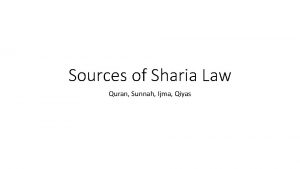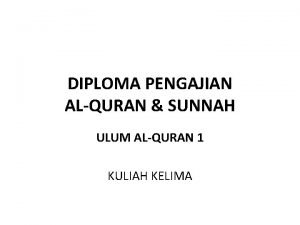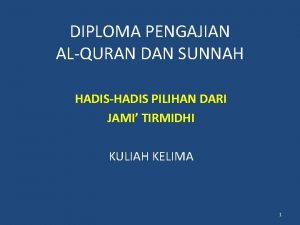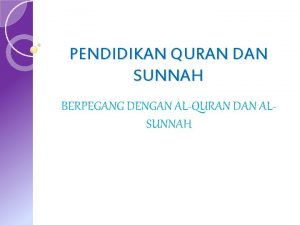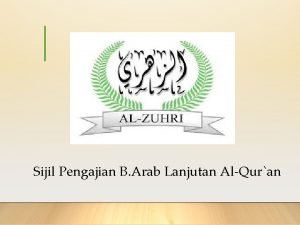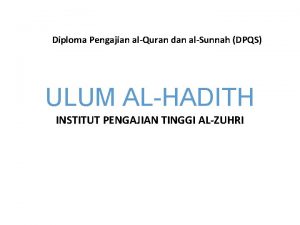Sources of Sharia Law Quran Sunnah Ijma Qiyas







- Slides: 7

Sources of Sharia Law Quran, Sunnah, Ijma, Qiyas

Sources of Sharia Law • Islam has given the most comprehensive legal system to mankind. Islamic law covers all aspects of life. Islam has its own personal civil, constitutional and international law. • The basic source of Islamic law is Divine Revelation. This has been given to the mankind by the Prophet Muhammad (PBUH) in two forms. One is the direct word of Allah, the Quran and the other is the Sunnah, the teaching of the Prophet Muhammad (PBUH). The Prophet Muhammad (PBUH) always acted according to the instructions of Allah (SWT).

Quran • Quran is the primary source containing all the fundamental directives and instructions of Allah. Herein are to be found not only directives relating individual conduct but also principles relating to all the aspects of social and cultural life of human being. • However, in Quran there at least five hundred verses which possess definite legal elements. • The scholars of Islam have developed a complete science of interpretation of the Quranic verses which can be seen in any book of Islamic jurisprudence.

Sunnah • Sunnah is the second source of Islamic law. Sunnah is Arabic word which means ‘method’. It was applied by the Prophet Muhammad (PBUH) as a legal term to represent what he said, did and agreed to. Its authority is derived from the text of Quran. • Quran says, “For you the life of Prophet (PBUH) is a model of behavior” (Al-Quran 33: 21) Sunnah explains the instructions of Quran. Sunnah which is established through reliable narrators is fully dependable as legal element.

Ijma • Ijma or the consensus of scholars signifies the importance of delegated legislation to the Muslim Community. The Muslim society requires such a rules making power to meet the practical problems for the implementation of Islamic Shariah (Islamic law). • “Muslims will never agree on a wrong matter. ” • As such the agreement of the scholars of Islam on any religious matter is a source of law in Islam.

Qiyas • Qiyas is the fourth important source of Islamic law. Qiyas means analogy. Problems about which there is no specific provision in the Quran or the Sunnah. In such issues, the scholars have derived law through analogical deduction on the basis of the provisions of the Quran and Sunnah on some similar situation. • The scholars have developed detailed principles of analogical deductions or Qiyas in the books of Islamic jurisprudence. • For example, because the Quran clearly explains the reason that consumption of alcohol is prohibited (because it makes the user lose control of his actions), an analogy can be drawn to drugs which induce the same affect. • Ijam and Qiyas derive their value and authority from the Quran and Sunnah, therefore, they are called dependent sources.

Concept of Halal and Haram • The concept of halal, permitted and haram, prohibited play a major role in deciding the legality of acts. • Scholars have created classifications of acts that span the difference between halal and haram, such as makruh, which is an act that is not recommended but clearly not prohibited. Scholars are agreed that if a certain action is not categorically prohibited then it is permissible.
